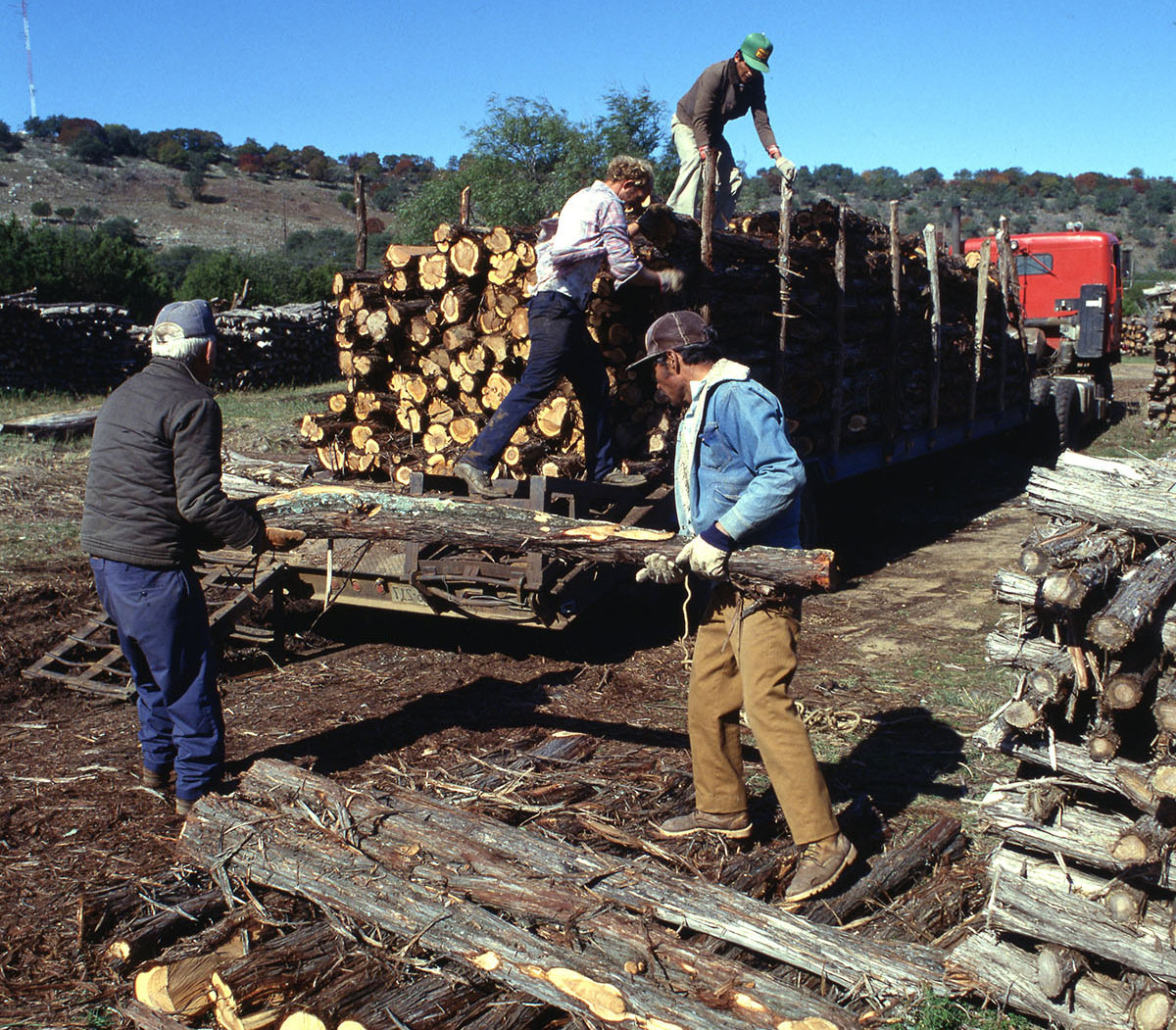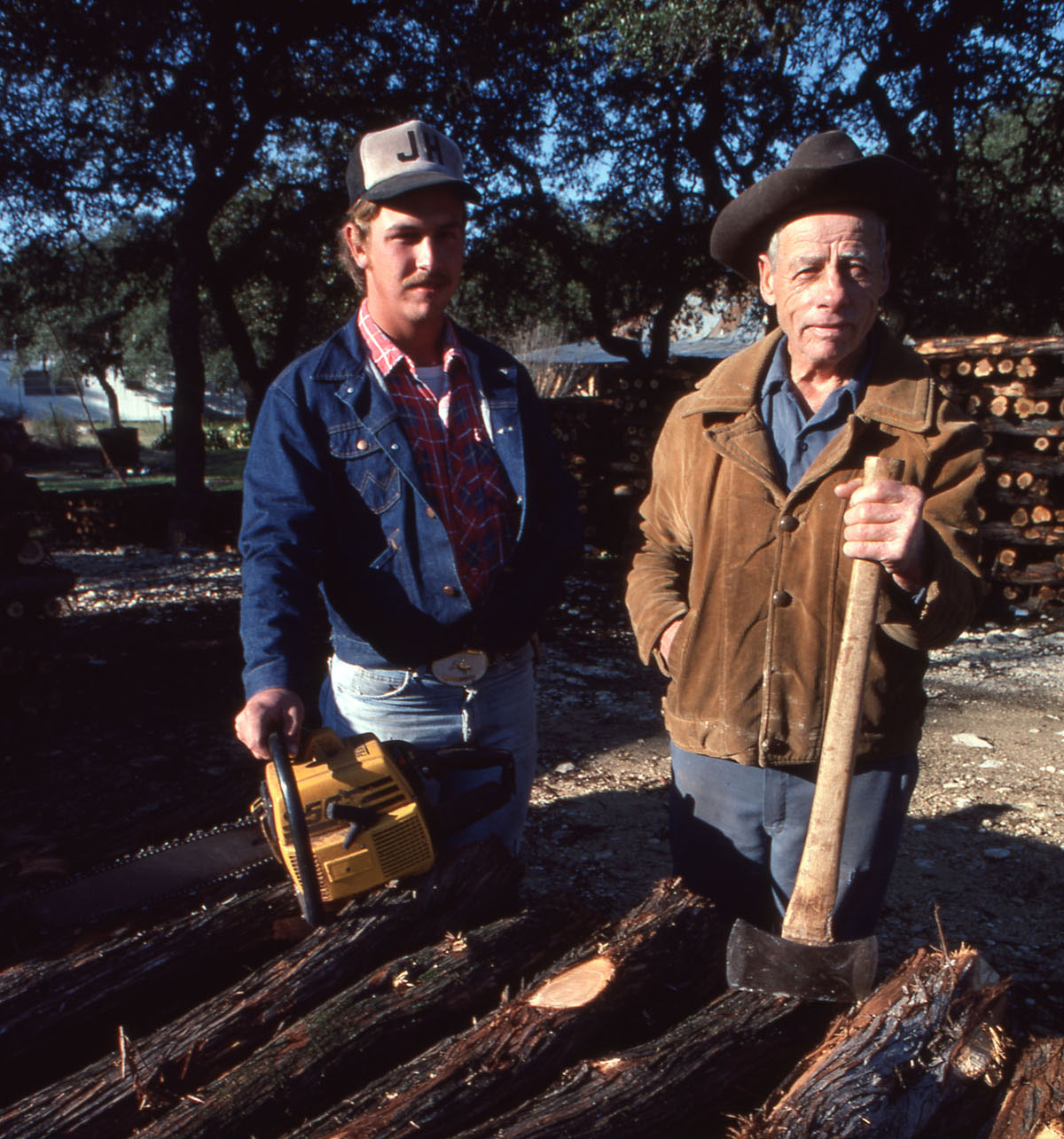
Cedar choppers load the products of their back-breaking work in the Hill Country circa 1985. Photo by J. Griffis Smith.
A Day in the Life of a Cedar Chopper
On May 13, Colorado Bend State Park hosts A Day in the Life of a Cedar Chopper, one of many events celebrating the centennial of Texas State Parks this year. Attendees will learn about the history of cedar choppers in the area, the tools they used, and the Cedar Tap Railroad that hauled cedar to Lometa. There will also be Dutch over cooking and s’mores. Reservations are required to enter the park, and the event is free to visitors.
Address:
1201 Colorado Park Road in Bend
Phone: 325-628-3240
Entry Fee:
$5 for adults, free for kids 12 and under
Website: https://tpwd.texas.gov/state-parks/colorado-bend
I had my one encounter with honest-to-goodness cedar choppers just about the time those “almost mythical, gypsy-like people,” as Texas literary legend Edwin “Bud” Shrake referred to them in an essay, were disappearing from the Hill Country.
It was August 1975, and I was driving to Austin from Oklahoma with friends in a Mercury Cougar. We blew a fan belt somewhere south of Hillsboro and pulled over to the shoulder. In those days, much of the countryside along Interstate 35 was ranch and farmland with not a single house or business visible. The highway had little traffic, at least compared to today. Motorola engineers had invented the mobile phone, but it was decades away from general use. We seemed to be in a hopeless situation.
One of my buddies, Larry Dickerson, who’d go on to a distinguished career in the Oklahoma State Senate, walked to the highway’s edge and flagged down a decrepit truck with no fenders towing an even more decrepit trailer. Two hard-eyed men climbed out of the cab. They explained they were from southwest of Austin and had traveled “up north” to deliver a load of cedar fence posts. They were headed home but would help us if they could. The driver took one look at the broken fan belt and said he could replace it.
He took off for a “beer store” down the way that carried auto parts. I saw chainsaws and several axes in the truck’s bed. I’d squirmed through The Texas Chainsaw Massacre a few months earlier at a drive-in, so I had concerns. But the two men turned out to be kindhearted souls who repaired the car. The good Samaritans didn’t want any money for their help. But they accepted my offer of a warm case of out-of-state Coors with joy. (It would be another year before Coors became widely available in Texas.) We then drove to Austin. That night at Scholz Garten (or Scholz’s, as the locals call the oldest bar in Austin), I told a friend from the University of Texas about the I-35 adventure. “Damn, son,” he said, “you were rescued by cedar choppers!” And that was the first time I heard the term.
By the mid-1970s, cedar choppers were very much an endangered species. “But there are still real people out among the evergreen hills, spring-fed creeks, and wild backroads west of Austin who earn their keep by clearing stands of scrub [mountain] cedar…,” Gary Cartwright wrote in Texas Monthly at the time. “They drive broken-down pickup trucks, deal in cash, preach self-reliance, and maintain a fundamental faith in the use of physical force.” Hired primarily by ranchers to clear land for grazing, cedar choppers worked a range that was largely confined to the Hill Country, though they could turn up farther north and west.
Author John Graves knew people he referred to as “cedar men” around his place near Glen Rose. And in 1946, Mary Whatley Clarke interviewed a cedar chopper named Goot Hight in Palo Pinto County, 200 miles northwest of the capital. But the wooded hills southwest of Austin were where they lived in the greatest numbers. Seventy years ago, West Lake Hills was a hotbed of cedar choppers, who built their own log dwellings, hunted for meat, and drew drinking water from springs where stately houses now stand.

Third and fourth generation cedar choppers James Roberts (right) and his son, Wilburn, carried on the family business at their cedar yard in Dripping Springs, circa 1985. Photo by J. Griffis Smith.
Ken Roberts’ The Cedar Choppers: Life on the Edge of Nothing traces their roots to Scotch-Irish immigrants who made their way to Appalachia, then eventually wound up in Central Texas. Clannish and reclusive, they spoke with an accent that sounded as if it came from West Virginia mountains instead of Texas. They distrusted all forms of government and tended to settle violent disputes themselves rather than rely on police, adhering to an eye-for-an-eye code. Some engaged in illegal activities such as dog fighting or operating moonshine stills. But most went about their lives lawfully.
All worked unbelievably hard. In the 1940s, famed naturalist Roy Bedichek observed an “aged” and “gigantic” cedar chopper at Friday Mountain Ranch. Though slowed by advancing years, the man pressed forward with cutting and trimming scrub trees into fence posts, his ax-work “accurate to a hair.” An adept axman could produce up to 200 a day. For their barbed wire fences, Central Texas ranchers and farmers valued Mountain Cedar posts because of their durability.
As late as the 1960s, cedar choppers could be seen hawking their freshly cut wares on Austin streets. But steel T-posts replaced cedar as time moved on. Bulldozers and tractors proved more effective at removing scrub cedar from grazing lands than hiring people with axes. Cedar choppers were forced to give up old ways and accept modern times. Edna Pierce, who came from a family of cedar choppers and married into another one, lived in a native stone house in West Lake Hills until she died in 1992. Her passing symbolized the end of the cedar chopper age. I have no idea what became of the guys who rescued my buddies and me back in 1975. But I hope they enjoyed that case of Coors.








